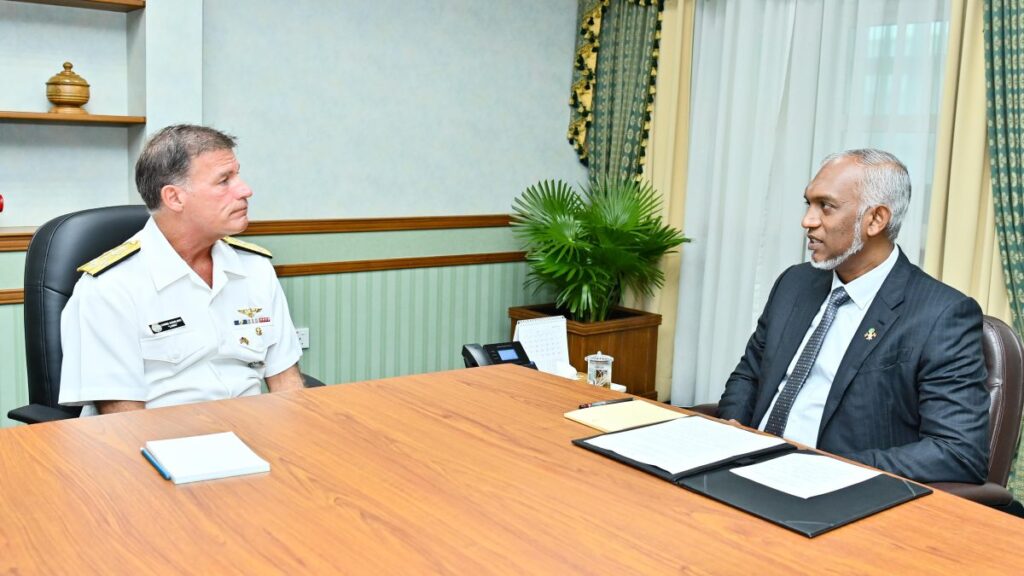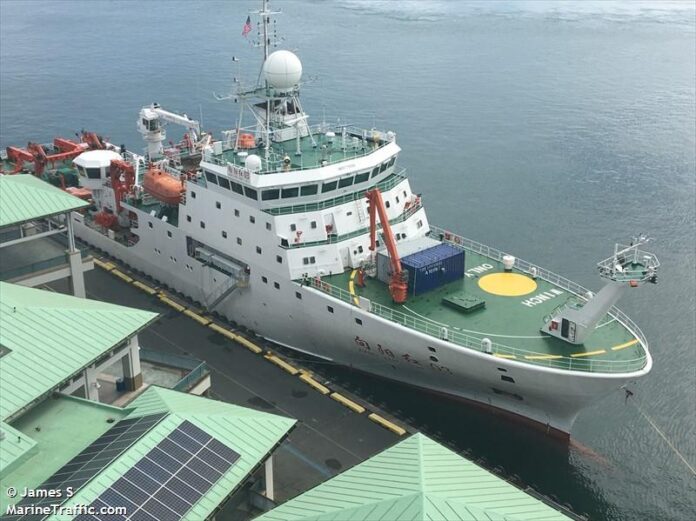By P.K.Balachandran
Colombo, January 24:
Maldives and Sri Lanka are in the unenviable position of meeting the contradictory demands of India and China on the visits of Chinese naval research vessels.
While India and China have competing strategic interests in the Indian Ocean around the Maldivian archipelago and Sri Lanka, the Maldives and Sri Lanka have the sovereign right to take decisions on such matters based on their national interest.
Both the Maldives and Sri Lanka have taken temporary decisions. While, Sri Lanka has declared a one-year moratorium on visits by all foreign research vessels, to enable it to formulate an agreed Standard Operating Procedure (SOP) that would be applicable to all, the Maldives has allowed a visit by the Chinese vessel Xiang Yang Hong 3 for “rotation of personnel and replenishment” only and not for any survey or research.

The Maldivian Ministry of Foreign Affairs stated on Tuesday that the Chinese had made a “diplomatic request” for Xiang Yang Hong 3.
Justifying the decision to allow the vessel to dock in Male, the Foreign Ministry said in a statement: “The Maldives has always been a welcoming destination for vessels of friendly countries, and continues to host both civilian and military vessels making port calls for peaceful purposes. Such port calls not only enhance bilateral ties between the Maldives and its partner countries, but also demonstrate the centuries old tradition of the Maldivian people welcoming vessels from friendly countries.”
The Maldivian decision could not have been an easy one as it has been taken when (a) it is in the midst of a bitter standoff with India on the latter’s military presence in the island and (b) during high profile visits from the US and China.
US Admiral’s Visit
Last week, the Commander of the US Indo-Pacific fleet, Adm. John Aquilino, met President Mohamad Muizzu in Male. The Admiral underscored USINDOPACOM’s unwavering commitment to fostering cooperation and enhancing the partnership between the two nations. The discussions were on mutual initiatives for bolstering national and regional security and sovereignty.
Adm. Aquilino also engaged with Minister of Defence Ghassan Maumoon and Chief of Defence Lt. Gen. Abdul Raheem, emphasizing joint efforts in countering trans-national threats and expanding domestic maritime security.
On January 21, Adm. Aquilino presented a package of U.S. grant-funded equipment to Maldives Chief of Defence Forces Lt. Gen. Abdul Raheem. The equipment is designed to enhance the safety and capabilities of Maldives’ Special Forces personnel during maritime security and counterterrorism operations.
The transfer between the two countries “demonstrates USINDOPACOM’s steadfast commitment to a sovereign, secure, and democratic Maldives,” the US Fleet’s statement on the visit said.
“USINDOPACOM remains resolute in its dedication to fortify the US-Maldives relationship as we offer steadfast support in critical requirement areas. Our commitment underscores the shared vision for a secure, rules-based, and open Indo-Pacific region,” the statement added.
Chinese official’s Visit
Meanwhile, the Maldives intensified its relations with China, a move underscored by the ongoing visit of Ms. Sun Haiyan, the Vice Minister of the International Department of the Chinese Communist Party (CCP).
In her meeting with President Muizzu, Vice Minister Sun focused on expediting the implementation of agreements signed during Muizzu’s recent state visit to China. She articulated China’s interest in bolstering strategic bilateral relations and offering training opportunities for Maldivians in various fields.
President Muizzu’s recent foreign policy decisions indicate a preference for ties with China. He has also requested that India withdraw its troops stationed in the Maldives. But India has said that it has not committed itself to withdrawing the personnel and that the matter is being discussed at a high level core committee.
Sri Lanka Had Defied India Earlier
Except for the cancellation of the visit of Xiang Yang Hong 3 now, Sri Lanka had not cancelled any Chinese vessel visit since 2022, just on India’s asking.
In October 2023, the Chinese ship, Shi Yan 6 docked at the Colombo port. Sri Lanka had only delayed granting permission for the arrival of the vessel due to concerns raised by India.
“Clearance was granted to carry out marine scientific research on 30 and 31 October,” a spokesman for the Colombo Foreign Ministry said at that time.
Scientists from the Sri Lankan National Aquatic Research Agency (NARA), personnel from the Navy and the University of Ruhuna were given clearance to go on board, he added.
Shi Yan 6 was said to be China’s first scientific research vessel focusing on geophysical exploration. NARA said samples of different seawater levels would also be tested.
Significantly, Shi Yan 6’s visit followed President Ranil Wickremesinghe’s visit to China a week earlier.
At that time, the US had also expressed its concern to Sri Lanka about the visit of the Chinese ship. US Under Secretary Victoria Nuland, who met Sri Lankan Foreign Minister Ali Sabry in New York on the side lines of the UN General Assembly session, had reportedly raised concerns about the visit.
In August 2023, again, India raised concerns over the visit of the Chinese People’s Liberation Army Navy warship Hai Yang 24. In August 2022 Yuan Wang 5? docked amidst Indian protests. It was a Chinese satellite tracking ship. Sri Lanka allowed the ship to dock at the southern port of Hambantota.
Humabtota port is under a 99-year lease to the Chinese company that built it after Colombo was unable to service a U$1.4 billion loan taken for the project.
Cash-Strapped Sri Lanka and Maldives
Cash-strapped Sri Lanka considers both India and China equally important partners in its task of restructuring its US$ 50 billion external debt. China is one of the top lenders to Sri Lanka. Sri Lanka owes USD 7.1 billion to bilateral creditors, including USD 3 billion to China. India had extended a credit of US$ 4.5 billion to help Sri Lanka tide over the crisis.
It is difficult for Maldives also to say no to China and India as it is heavily indebted to both. In addition, India is the regional power which neither the Maldives nor Sri Lanka can ignore.
If India has a natural strategic interest in the Indian Ocean, China has developed an interest as a result of its tremendous economic growth in recent years. Additionally, 80% of China’s enormous energy needs are carried over the Indian Ocean. This sea lane has to be protected. China has only in one base in the Indian Ocean at Djibouti and therefore it needs ports to dock for rest, recreation and replenishment, at the very least.
Since India has to assert its natural right over the Indian Ocean, and is also a growing economic and military power, it has to fortify itself against external challenges. Hence its sensitivity to China’s acitvities in the Indian Ocean.
END





